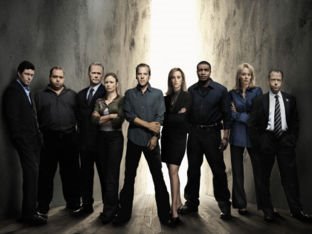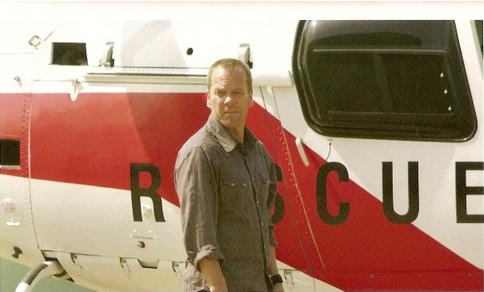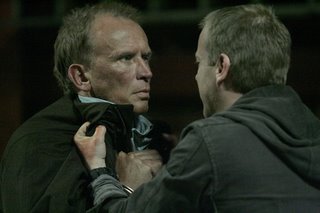 24 - SEASON 5: RETROSPECTIVE
24 - SEASON 5: RETROSPECTIVEJack Bauer (Kiefer Sutherland) has been protecting Americans, and occasionally the world, for 5 years now. The maverick agent has successful thwarted all manner of terrorist plots; including an assassination, detonation of a nuclear bomb, the release of a killer virus, and the meltdown of nuclear power stations. It’s all in a day’s work...
At the close of season 4, Jack faked his own death to escape the clutches of the Chinese, who held him responsible for killing one of their countrymen within the grounds of their Embassy (quite rightly, in fact).
Season 5 opened 18 months later, with newly-elected President Logan (Gregory Itzin) about to sign an anti-terrorism alliance with Russian President Suvarov. However, the assassination of Former President David Palmer (Dennis Haysbert) signalled the beginning of a new threat to the country from Russian dissidents, and the services of Jack were required again -- although he’s living a new life in California…
24 was a revolutionary show when it began. Although its real-time format has never been duplicated, its continuing plot and reliance on audiences to watch each episode is something that has greatly affected television. More shows are now willing to invest time and effort into creating seasonal stories -- notable examples being Desperate Housewives and Lost.

But loyalty can be stretched. The problem facing 24 in recent years has been how to keep things fresh, yet recognisably the same. After the "blip" of season 3 (not terrible, but cursed by a meandering middle), the writers threw everything at the wall for season 4. This scattershot approach created a wildly entertaining season, but sacrificed credibility to breaking point.
For season 5, the writers again decided to divide the season into Acts: 1 - the framing of Jack for the murder of David Palmer, 2 - an airport hostage crisis, 3 - toxic nerve gas terrorist plots, 4 - the search for an audio recording, 5 - a submarine attack, and 6 - a final attempt to bring the corrupt to justice.
Each of these acts dovetailed into the next one, although yet again 24’s structuring began to break down just after mid-season, starting from the moment a main character is unmasked as the villain. 24 benefits from giving its writers longer to plan the season (24 doesn’t start in the US until January, not September). However, you can tell when the "master-plan" reaches its conclusion and the writers scramble to keep the story going.
Another common complaint made against 24 is that, after five years, audiences are skilled at guessing the twists now. The writers have to be very clever to manufacture the surprises that came so easily in season 1. Fans are quick to second-guess everything now and the show has built up an inordinate amount of clichés (such as the amount of "moles" working in government agencies, the poor CTU security, or how villains seem able to conjure escapes routes, back-up plans and secret accomplices from thin air.)

But, in some respects, that's is all part of the fun of 24. The show is quite often ludicrous, but it knows it is. That’s still no excuse for lazy writing, but season 5 was notable for subverting expectations on quite a few occasions: a mole is revealed as just a misguided White House cohort, an act of terrorism was actually organized by a government official, and (in the seasons most controversial twist) the President of the United States himself was revealed as the mastermind!
There were some characteristically ballsy storytelling decisions in season 5, and while some of them proved exasperating, most made a twisted sort of logic once you accepted them.
With so much emphasis on plot, 24’s often overlooked for its acting. To be honest, there’s a good case for claiming that characters on 24 tend to operate in set patterns, with character development mere reactions to the dizzying array of double-crosses or tough decisions to be made. As such, Kiefer Sutherland again spent most of the show just running around with a gun, barking orders, glaring at villains, then grabbing people by the throat and shouting "Dammit!" when a plan doesn’t come together…
In past years (or "days"), Jack’s action-man status was tempered by an emotional connection to the plot (season 1 - his family were kidnapped, season 2 - his daughter was caught up in the mayhem, season 3 - his past came back to haunt him, season 4 - the kidnap of his girlfriend). But in season 5, Jack’s personal life took a back seat largely. Yes, he still had emotional connections to a few characters (notably turncoat mentor Christopher Henderson) and there were mishandled moments with estranged daughter Kim, and ex-girlfriend Audrey, but this time Jack did everything because of patriotic duty. All very noble, but it’s more difficult to connect with Jack’s struggles without the personal touch.

The best moments of 24’s fifth season were to be found in its excellent first half. The killing of two major characters in episode one was a brave and unsettling beginning. The neat move into a hostage-taking scenario at an airport was tense (despite the worrying presence of yet another "adopted family" Jack had to protect). From there, the story brilliantly moved into the central threat for season 5, namely the canisters of Sentox nerve gas.
In these early plot-lines, 24 was on a definite roll. The show moved skilfully from one threat to the next, and wove storytelling layers into itself: the President’s mentally unstable wife Martha, the folly of Walt Cummings’ involvement with the gas, the loss of Lynn McGill’s CTU key-card, and the Russian motorcade being targeted with Logan’s help. All of these elements built to two genuinely chilling episodes where CTU itself was attacked by the nerve gas (resulting in two superb character deaths).
But, once the central nerve gas threat was eliminated, the season began to falter. The same problem had been encountered in season 2, when the nuclear bomb detonated and the writers padded the final third of the season with a mad scramble for a microchip. Lessons obviously weren’t learned, as season 5 has its own mad scramble for an audio tape…
Still, while 24 has yet to successfully stretch a central threat over its entire run, it gets away with it yet again by never letting the entertainment slip. Yes, 24 is certainly flawed… but it refuses to be boring!
The real star of the show this season has been the exemplary work from Gregory Itzin as President Logan. Clearly a cipher for Richard Nixon, in tone and appearance, Itzin was a worthy successor to Dennis Haysbert President because he was such a polar opposite. In early episodes he was an indecisive, weak and negligent man, who then became plausibly chilling and ruthless, managing to make the transition work. Through this he never totally lost our sympathy, just gained our pity. Superb work.
Likewise, screen wife Jean Smart should be applauded for providing decent support for Itzin. Her character of Martha was certainly more intriguing in the first half, with her unstable mental state being more prevalent, but despite a degree of mishandling near the end, she was always very good.
Mary Lynn Rajskub remains difficult to get a handle on as computer geek Chloe O’Brien. One minute Chloe is annoying and unprofessionally rude to superiors, the next minute her unquestioning loyalty is admirable and inspiring. But that’s clearly the point to her, so we’ll let it go…
James Morrison is a great character actor currently being given little to do as CTU boss Bill Buchanan, although his rich voice and presence is an agreeable addition to the show. Just give him more to do next time!
The most interesting guest star was Lord Of The Rings’ star Sean Astin as naïve Lynn McGill, a by-the-book character that created tension at CTU. His eventual downfall and redemption -- in the form of a life-saving sacrifice - resulted in one of the show’s greatest screen deaths. Excellent work.

Audrey Raines, played by Kim Raver, is a strong female role with plenty of believability because she’s gutsy and strong-willed, yet fragile and tender. The format of 24 just doesn’t allow her the time to play with the personal aspects too often, but when it does she’s amazing.
Roger Cross’ Curtis Manning moved into being a full-time field agent, a role more suited to Cross’ hard-ass strengths. Jude Ciccolella continued his dignified and well-performed work as Mike Novick, an underestimated character that has provided me with endless delight.
Peter Weller was a great choice for Christopher Henderson, Jack’s villainous mentor, and clearly relished the role. Julian Sands was the season’s lead terrorist, apparently continuing a tradition started last year with Arnold Vosloo… of casting slimy villains with limited acting talent. Sands wasn’t terrible, but his stilted performance was quite often unintentionally funny.
Glenn Morshower has been in the show since season 2 as Secret Service Agent Pierce, and was finally awarded with a more significant role to play. An immediate cult character, it was very entertaining to see the stoic Pierce save the day whilst simultaneously engage in a curious "relationship" with the First Lady. Brilliant.
William Devane made a welcome return to the show as Secretary of Defence James Heller, always a great presence onscreen thanks to his hangdog expression. One character who didn’t really resonate this year was Louis Lombardi as techie Edgar Stiles, someone designed to be endearing and lovable, yet too often just annoying and unapproachable. Thankfully for the actor his demise was another highlight of the season, although I still don’t think he deserved the "silent clock" treatment at that episode’s close…
Someone who did deserve the silent clock was Carlos Bernard as Tony Almeida; blown-up in episode one, only to regain consciousness for a few episodes, before being murdered in a quite unexciting way by Henderson. This was a tragic waste of an opportunity for a character that had provided a backbone to the show since season 2. Shameful.

Similarly wasted was Elisha Cuthbert in a curiously unemotional meeting with her father, who she thought died 18 months ago. The scenes between Cuthbert and Sutherland were so underplayed that it became frustrating to watch. The writers were clearly inept at handling this big emotional scene, not helped by an aloof performance from Cuthbert.
Jayne Atkinson’s Karen Hayes could have been another frustrating female boss character (along the lines of last year's Erin Driscoll) and for awhile she was. But it was refreshing to see proved her worth quite early on. Not so for Stephen Spinnella’s Miles Papazzian, an outright bastard from the beginning who deserves to come back next year for his comeuppance.
Overall, season 5 again limped in the final quarter. The finale neatly wrapped up the story, but didn’t feel particularly eventful (in fact, it’s possibly the worst finale of the show). I hope for season 6 the writers plan the season’s second half with just as much cunning, imagination and verve as the first half of season 5.
The pitfalls of 24 continue to grow harder to evade, an unavoidable symptom of its format, but one that could be annulled if brave decisions are taken in season 6 with the show’s location, characters and overall plot.
Still, after five years it’s amazing that 24 still remains this addictive and exciting. For every silly plot convenience and oversight, there’s usually two great examples of strong writing and interesting characterisation just waiting round the corner.
But, for 24 to truly break free of its restrictions, we may have to wait for Jack Bauer’s sojourn into movie territory. The clock is ticking for summer 2007…

